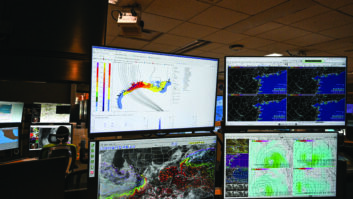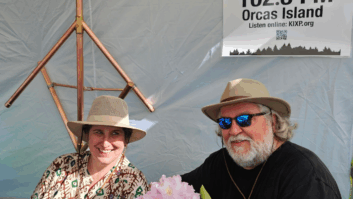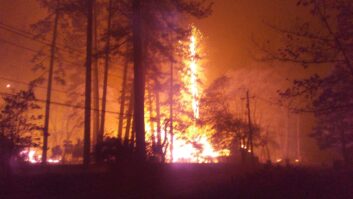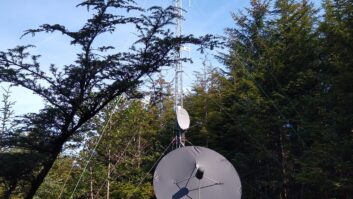Radio engineers have always been concerned about the reliability of their transmission systems. News stations in particular have a special responsibility to provide reliable and up-to-date information in emergency situations. In recent years, catastrophes like Hurricane Katrina have demonstrated the need for radio stations to maintain their operations when many, if not all, the other public systems such as cell phones and utility electricity have failed. The portable nature of radio makes it an ideal emergency medium.

Howard Price in ABC’s TV-2 Control Room, the current origination point for ABC News programming in New York. In this issue’s interview we spoke via e-mail with Howard B. Price, whose full-time responsibility is to plan and prepare for emergency operations. Price is the director of business continuity and crisis management at ABC News. He is charged with making sure that all the ABC News platforms (radio, TV and Internet) are up and running, no matter the circumstances.
Price grew up in Poughkeepsie, N.Y., and began his career in broadcasting in an era when local radio in most places included local news.
Tell us a little about your experiences and how you began your career in broadcasting.
My professional broadcast career dates back nearly 36 years, and my first gig was as a high school intern with WKIP(AM) in Poughkeepsie, where I spent most of childhood. I served primarily in the news department, eventually parlaying the internship into a paying summer job as a reporter and anchor.
From there, it was on to the Medill School of Journalism at Northwestern Uni¬versity (1976–80), and during my studies there, I worked part-time at WIND(AM), Chicago, then owned by Westinghouse Broadcasting, and newly reformatted as a news/talk station. I served as a talk show producer and a newswriter/producer.
After graduation (1980), my newly-minted BS in journalism in hand, it was off to my birthplace, Baltimore, Md., and a newswriter’s job at WJZ(TV), then also owned by Westinghouse. I also served there as a newscast producer and assignment editor.
I joined WABC(TV) in late 1981 as a newswriter, and would go on to serve as producer, suburban news bureau chief and assignment editor. I earned an MBA in management and marketing from New York University’s Stern School of Business in 1993 before leaving WABC in 2008 for the newly-created position of director, business continuity and crisis management at ABC News.
While at WABC, I was the recipient of two local news Emmys and shared in the Peabody Award given to ABC News for its coverage of the 9/11 attacks.
In the wake of 9/11, I also took on ad-hoc responsibilities for developing contingency plans for WABC that became models for plans at other ABC-owned stations. And I earned formal certification as a business continuity professional.
Are there certain real-world events that you lived through that ignited your interest in emergency preparedness?
Each of these chapters of my life is highlighted with some great anecdotes that surely shaped the course of my career, and which no doubt influenced what I do now.
As a five-year-old, I marveled at the power of television to unite a nation with its coverage of the JFK assassination — an event that fueled my passion for broadcasting. Two years later, radio was the great comforter and informer when the Great Blackout of 1965 plunged much of the Eastern Seaboard into darkness, and many TV stations were knocked off the air.
I was privileged to cut my teeth professionally in radio when many local radio stations, even those in small towns, still had well-staffed news departments.
In Chicago, I experienced again the importance of radio as a source of information, and a tool for holding public officials accountable, when Chicago’s city services proved no match for the Blizzard of ’78.
And in New York, I learned just how vital TV and radio are in times of crisis — to their audiences and to each other — as the 9/11 attacks exploited the vulnerabilities in transmissions systems at a time when listeners and viewers looked to the media for information they could get nowhere else.
What do you do for ABC News today?
Basically, my job involves working with all ABC News business units — those on the air, and those which support our broadcast operations — to assess risks and threats, and help draft plans to prevent, mitigate, respond to and recover from disasters large and small.
I’ve held this job for about two-and-a-half years, and I believe it’s the only such job in existence in the broadcast network news business today.
What exactly is business continuity?
The field has existed for many years, but really, only in the post-9/11 era has broadcasting embraced it institutionally. To be sure, forward-thinking station operators had emergency plans and resources to back them up, but in many cases these were ad-hoc plans. BC planners now try to bring a more systematic approach to emergency response, and work to assure the continued viability of broadcast operations beyond the immediate recovery from a disaster.

In the aftermath of Katrina, radio proved to be an important medium for getting information to storm survivors when most other communications systems were shut down. Credit: Photo by Matt Ewalt. Used under a Creative Commons license. BC traditionally has found its greatest support in industries like financial services, where regulatory requirements stipulate that firms maintain contingency plans as stewards of other peoples’ money. After 9/11, and the tragic loss of much of New York’s radio and TV transmission facilities — not to mention the lives of six heroic broadcast engineers who manned their transmitter rooms even as the World Trade Center collapsed — the FCC assembled a task force to examine the vulnerabilities and preparedness of America’s telecommunications infrastructure. And business continuity became a top-of-mind concern of the nation’s broadcasters.
And that’s exactly as it should be. On 9/11, cellular and Internet systems were overwhelmed; for many, traditional radio and TV were the most accessible and most reliable sources of information. Radio and TV have to be at the best when things are at their worst. Our listeners and viewers expect nothing less. Good BC planning makes sure stations and networks have the human and capital resources — and the plans they need — to stay on the air in times of crisis.
How does your background in news fit in with your interest in business continuity?
I talk a lot about 9/11, because it frames my experience as a business continuity planner. But in truth, my previous life as a news assignment editor prepared me well for all kinds of events that demanded an instant “Plan B.” Well before 9/11, there was the bombing of Pan Am 103, the crash of TWA Flight 800, the Northridge and Loma Prieta earthquakes in California and other events that happened when stations were least prepared to deal with them: after 5 p.m., late into the night, the early hours of the morning or a weekend.
So how do you muster command and control, mobilize resources, maintain a constant stream of information to your audience, fact check and establish rumor control — all at the worst possible time? These are skills every good assignment editor knows, and they are skills essential to every good business continuity and crisis management professional.
Is there one particular news emergency that you recall that made a special impression on you?
An event shortly after 9/11 brought the criticality of BC into focus for me.
I’ll never forget the Great Northeast Blackout of 2003. I was about to give a visitor a tour of the WABC(TV) newsroom, when the place took an unusually large power hit. Our electrical system stabilized, but the phones began ringing off the hook, and my then-boss came running out of his office, yelling that he’d just spoken with a friend who told him Cleveland was blacked out. We ran to the windows and saw traffic lights around the station were out — and realized we ourselves were running on generators. But cellular service, the lifeblood of our ability to coordinate live news coverage, was fading fast. Our two-way radio systems likewise were without power. And our newly relocated microwave and satellite control room hadn’t yet been wired into the station’s emergency power systems.
As engineers worked feverishly to run extension cords from outlets on e-power to racks that needed it, I dashed downstairs to a spare live truck, equipped with a full-power two-way radio. And there I remained, for the next eight hours, the truck radio in one hand, and my handie-talkie in the other — the only link between our live trucks, helicopter, control rooms and newsroom. In the end, we supplied outstanding coverage to our viewers. But the effort to do so was Herculean. The ’03 Blackout revealed just how important backup plans and systems — and regular exercises to test them — were to our ability to perform in real-world emergencies.
You have established a nonprofit “idea exchange” called MediaDisasterPrep.com. Can you tell us more about that?
With so much of the world in chaos these days, it’s a wake-up call to broadcasters that bad things large and small can impact their operations in unpredictable ways. I believe disasters are those things for which we do not plan, and while planning won’t completely protect you, a good plan, well-rehearsed, can mitigate most any impact.
MediaDisasterPrep.com was born of my desire to give something back to the industry I love — an industry that simply “has to be there” when all else fails. It is a non-commercial venture — I make no money from it, and provide it purely as an idea exchange to make our industry’s emergency readiness the best that it can be.
Featured on the site are tips to jump-start any station’s contingency planning process, along with an extensive video and audio archive to illustrate the wide variety of things than can and do go wrong, and the profound impacts those events can have on any broadcaster’s operations. The site has a companion blog, MediaDisasterPrep.wordpress.com, where I write about business continuity themes of the moment. And I maintain a Facebook (search for the MediaDisasterPrep.com page) and Twitter presence (@mediadisaster) as well. I’ve become a national speaker on the subject of business continuity, presenting at a number of industry conferences and even guest lecturing at MIT. It’s a gratifying validation of how essential continuity planning has become in our business.
How should the radio industry think about its role in disaster planning?
Even with the advent of satellite and Internet broadcasting, radio was, is and I hope will forever be America’s most important source of local information, especially in times of crisis. There are far more radio than TV stations, and their connection to their listeners is unlike that of any other media.
So to my mind, it’s especially important that radio stations, no matter their size or coverage area, always have plans — tested plans — for staying on the air, no matter what.
What to plan for? You name it. Each station’s geographic location has its own specific risks. But I counsel stations — and my own network — to think less about specific scenarios (there are just too many to fathom, and many we’d never think of) and think more about impacts.
In any crisis, there are really only six: Infrastructure (something affects your building), Technology (something affects your systems), Personnel (something affects your people), Stakeholders (something affects your vendors, your audience, your sponsors or the regulatory environment), Finance (something affects your cash flow) and Reputation (something affects your credibility among your stakeholders).
So when writing plans, I tell folks not to preoccupy themselves with the cause of a problem. Focus instead on how that problem has affected your operations, and what your fallbacks are to deal with those impacts. I also advise people not to think of problems as isolated events, but to prepare for a cascade of issues. It’s Murphy’s Law — whatever can go wrong, usually does.
What are some high-impact preparations that news radio stations should implement?
Where radio specifically is concerned, I’d say the top three concerns would have to be loss of power, loss of transmission systems and the ability to staff up knowledgeable newsgathering on very short notice and at the worst possible time.
Planning for these contingencies isn’t really difficult, but it ain’t cheap. And stations embarking on contingency planning for the first time need to make sure there’s an executive champion with an open checkbook, committed to the process philosophically — and as a matter of public service.
Loss of power? Install a generator with a large and reliable fuel supply. Want to really cover your bases? Install two at the station, and two at the transmitter site.
Use an STL, or a bunch of them? How will they be powered in a grid outage? A bad storm could knock out your relays, so perhaps you want to think about some dark fiber you can light up between your studios and your transmitter. Or perhaps solar-charged batteries at each site.
Towers are the most vulnerable assets at most stations; do you have a backup antenna on someone else’s stick? Or maybe a tall building? And if you had to completely transfer operations somewhere else, what’s your plan for doing so? And don’t forget your web presence. Depending on the crisis, with so many smartphones out there now, it could be a real lifeline to your listeners, allowing you to stream even if you lose your on-air signal.
Can’t afford a big news staff? Why not build a relationship with a local TV station, maybe the one affiliated with the same network as your station? Arrange a standing feed so you can piggyback on their coverage of a breaking news event until your own staff can ramp up.
Have cots, shelf-stable food and drink on hand to support the people who might have to live at the station during periods of extreme emergency.
Perhaps most important, do you have a cross-training program in place to make sure your receptionist can run the board, your sales manager can go into the field and gather news, your promotions team can handle rumor control and listener inquiries?
And did you know how the RePO man (or woman) could be your best friend in an emergency? That’s RePO as in recovery partnership opportunity, a contingency package your sales force can design to help local businesses join you in preparing your community before disaster strikes, and rebuilding your community after a crisis.
A final word?
There is one other incident that I think speaks volumes about why it is so important for stations to plan for contingencies.
In May 2007, WABC(TV) was knocked off the air when a fire erupted behind its news set in the station’s only studio — with less than 15 minutes to the start of our late Sunday night newscast (generally, the most-watched newscast on our schedule).
The building filled with smoke; the news portion of our studio was seriously damaged and out of action for weeks. Fortunately, everyone escaped without injury. But we had to improvise quickly in order to resume normal broadcast operations before the start of our early morning news.
It was the first time our station failed to air a scheduled newscast in its modern history; the fire occurred when the station was thinly-staffed and backup facilities were not readily available.
Operators must remember that it’s not just wide-scale catastrophe for which they have to plan; indeed, I’d suggest that day to day, it’s the “routine” emergencies — fire, flood, technical failures, etc. — that will trip them up.
Since 9/11, our industry has been preoccupied with “doomsday scenarios.” And surely, in this day and age, we must plan for those. But the average station will find itself dealing with more common disruptions that can be just as impactful operationally and financially — and which could strike at the worst possible times.
Moreover, simply “having a plan,” even a well-documented one, is insufficient. Plans must be regularly tested to account for changes that occur over time, and to assure that all staffers know who is doing what and when to mitigate injury, damage and operational disruption. A plan, generally, isn’t worth the paper it’s printed on if it is not tested — rigorously and often.
Interviewer Michael LeClair is technical editor of Radio World Engi¬neering Extra and chief engineer for WBUR, Boston.







